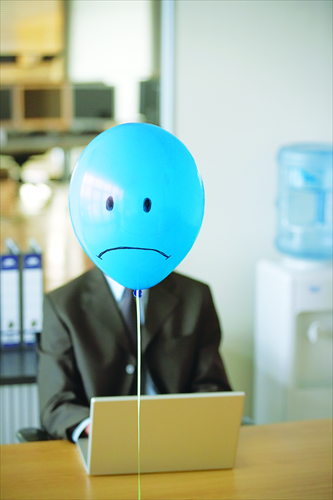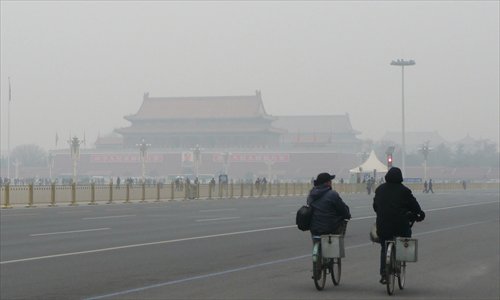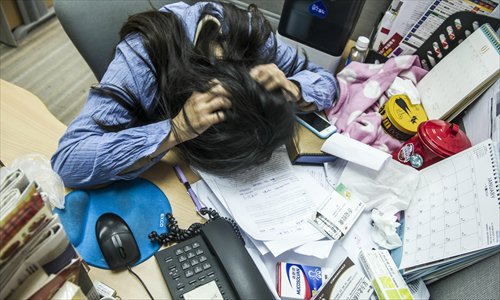Crappy New Year
Kiko Feng has recently been stuck in a slump. When she wakes in the morning, she feels tired and nauseated. When she does her hair and puts on her makeup, she feels the urge to cry. When the bus she takes to work becomes stuck in traffic, she feels a heavy burden. And by the time she arrives at her office, she feels the pressure of work is too much to handle.
Feng doesn't feel like talking, working, socializing or shopping. Actually, she doesn't feel like doing anything at all - and she doesn't know why.
"I have been like this for more than a month. I'm just sad for no real reason," sighed Feng, who works at a private education agency in Beijing.
Feng has considered seeing a doctor to seek medical advice, but even the thought that she has a problem terrifies her. It wasn't until she read a recent news story about seasonal depression she began to better understand her condition.
"I experience this slump every year around this time, so I think I'll overcome it as time passes," she said.

After working intensely all year, the prospect of relaxing over the Spring Festival period can actually leave many white-collar workers feeling physically and mentally drained. Photo: IC
Misery is in the air
When Feng browses her friends' updates on Weibo, China's equivalent of Twitter, and WeChat, a mobile messaging application, she takes comfort in knowing she isn't the only "winter weeper." Her friends moan about becoming sick, feeling blue or drowning their sorrows to forget about pressures of work, family or even the fact snow hasn't yet fallen in Beijing this winter.
"I want to know if everybody is [depressed] like me, but at the same time I don't want to talk to anybody about what I'm going through," Feng said.
In her desperate quest for answers, Feng searched "year-end syndrome" in Chinese online to learn more about her condition. Her research revealed that many factors can trigger a sudden spiral of depression at this time of the year, including work, social activities and pressure about returning home for Spring Festival.
Aged 30 and single, Feng said her parents' growing expectations for her to marry and settle down is a constant source of stress.
University freshman Li Yaxian has also felt blue about her life lately. "I thought I'd be very happy after my semester-end exams, but I haven't been. I'm not sick, but I have constant headaches," said Li, 17, who spends most of her time languishing in her bedroom.
He Yumin, director of the psychosomatic medicine branch under the Chinese Medical Association, said he has seen an influx of patients feeling tired and exhausted in the lead up to Spring Festival.
"In China, it's actually pretty common for many people to feel tired and downcast around the Lunar New Year," said He.

Reuniting with family over Spring Festival can actually cause more stress than happiness for some people.Photo: IC
White-collar workers most at risk
After a year of tiresome work, the thought of heading home for China's most important holiday should be cause for mental relaxation. But He said stress levels can peak at this time and cause illness because relaxation immediately after prolonged physical and mental fatigue lowers the body's defenses.
"After working and exhausting all effort, the whole body relaxes, which results in decreased levels of many stimulating hormones," said He. "People already busy with work go into overdrive at the end of the year, causing the body's physical functions to weaken. Of course, the coldness and haziness of winter also make us more vulnerable."
Common symptoms include fatigue, lethargy and even a cold or mild fever, said He.
The most at-risk group is white-collar workers aged between 20 and 40, particularly those who are sensitive and vulnerable to mood swings.
"Those who are always busy and live a tedious life are particularly likely to feel depressed. Their anticipation of relaxation over the holiday can actually make them feel pessimistic instead," He said.
He added that many people experience mild depression after travel, while students who sleep for long periods days after big exams are likely to have weaker immune systems when they are finally active again.
"This is a common process of self-adjustment related to one's psychosomatic functions. It's usually not a big deal, but if you haven't recovered after a couple of weeks you should be on high alert," said He.

Blues triggered by the haze in Beijing are best treated with light therapy or exposure to sunlight. Photo: IC
Reasons to feel SAD
Psychiatrist Jian Lili told Metropolitan that seasonal affective disorder (SAD) is a common form of depression that peaks at the end of the year. SAD sufferers typically only battle their depression on a seasonal basis, with winter seeing the biggest spike.
"Identifying depressive episodes at a particular time of the year is an important part of the diagnostic criteria," said Jian. SAD symptoms are often the same as regular depression, including a lack of energy, decreased appetite and social withdrawal.
Beijing's hazy weather is a major cause for the onset of the blues, said Jian.
"Lack of sunlight is a very big trigger," she said, explaining that one of the most effective SAD treatment methods is light therapy whereby patients are exposed to sunlight or an ultraviolet lamp.
According to the American Psychiatric Association's Diagnostic and Statistical Manual of Mental Disorders, SAD is not regarded as a separate disorder but as a pattern of major depressive episodes in patients already clinically diagnosed as depressed.
"Pressure at the end of the year might cause depression, but this doesn't necessarily mean it is SAD. Cases should be treated systematically," Jian said.
One of Jian's suggestions to stave off the seasonal blues is what is known as the "three threes," specifically eating three meals with company, walking 30 minutes and getting 30 minutes of sunshine daily.

White-collar workers who go into overdrive at the end of the year are at risk of experiencing depression. Photo: Li Hao/GT
TCM remedies to beat the blues
Traditional Chinese medicine (TCM) doctor Wang Yuntao noted that many lifestyle factors contribute to year-end stress, including worrying about meeting work expectations by the end of the year and preparing for family and travel arrangements over Spring Festival.
"Based on TCM theory, the end of winter and beginning of spring results in weather transforming from bitterly cold to warm. When the yang energy inside one's body is rising, it causes an agitated mood that can linger," said Wang, referring to the active, positive, masculine force and source of light and heat in Chinese philosophy.
According to Wang, black and green foods can help with one's depression.
"Black [food] goes to the kidney, nurtures the water and restrains the fire. Green [food] goes to the liver, clears the heat and soothes the body," he said. Eating black fungi, sesame seeds, kiwi fruits, cucumbers and beans are good for beating the blues, suggested Wang.
Aside from watching what you eat, He said it is important to see the early warning signs and "avoid being trapped" in your depressive state.
"You should find exciting things in life, such as meeting old friends, visiting relatives, planning the next year and so on. Try to turn up your excitability consciously," said He.
Tips to avoid suffering year-end depression
Expose yourself to more sunshine
Exercise more
Don't eat too much over the holiday
Eat more black and green foods
Read more uplifting news stories
Set positive New Year's resolutions
Avoid socializing with negative people
Don't be afraid to seek medical help